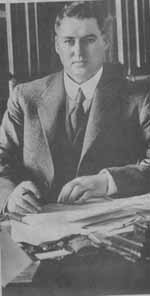

On the tin fields of Far North Queensland, Australia, Edward Granville Theodore created an organisation that propelled him into state and federal politics. This organisation was the 'fighting' AWA (Amalgamated Workers Association).
In April 1907 conditions in the Vulcan Mine at Irvinebank had deteriorated. As the shaft of Australia's deepest tin mine descended, the value of the ore declined. This prompted the mine owners to propose wage cuts. The workers went on strike but failed in their claims for fair compensation. The workers went back to longer hours for less pay.
Theodore arrived on the field a couple of months later. A hulking 23 year old over 6 ft tall with big hands and a strong body, Theodore was an experienced miner and had been accustomed to union protection and a higher value for his labour in the mines of Broken Hill.
Theodore's job was to work at the bottom of the shaft, drilling it deeper. In the dark and dusty, poorly ventilated mine, accidents were common and sometimes fatal. While Theodore was working, he was injured when some timbers fell from a higher level. Carrying the wound on his back that was to scar him for life, Theodore sought an audience with the 65 year old mine owner John Moffat.
Theodore demanded better conditions for the workers. Moffat replied 'go away and be a sensible fellow'. Theodore went back down the hill to the Vulcan Arms Hotel and there he founded the first branch of the Amalgamated Workers Association along with a group of supporters and W. 'Bill' McCormack of nearby Stannary Hills.
The Strength of the AWA lay in its organisation as a 'fighting machine'. With a strong central executive and the combination of all skilled and semi - skilled labour across a range of industries in any given area, the AWA quickly grew and spread to cover the whole of the north of the state.
The large worker base was also a political constituency and the workers of the north voted both Theodore and McCormack into state politics. The AWA spread over the mining fields and into the coastal districts to encompass sugar workers in the mills and on the farms of north Queensland. The worker base of the union grew and so did its political and industrial power.
The techniques and organisational methods of the AWA were adopted by other organisations. Socialism was young and worker organisation was still experimental. The world watched to see which experiments would be the most successful. Many people dreamed of Australia as a 'workers paradise'.
The Australian Workers Union (AWU) was growing in the southern states and adopting the methods of Amalgamation across industries. To form a truly national worker organisation, the AWU met with the AWA at a meeting in Townsville in 1913. The AWA then became the Queensland Branch of the AWU.
Theodore was appointed Treasurer of Queensland's Labour government in 1915. He became Queensland's youngest premier at the age of 34 in 1919. He was to serve in that role for 6 years during which he would preside over one of the first socialist governments in the world.
One of the first tasks he undertook as premier was the socialisation of the base metals and mining industries in the north. Theodore's government acquired Irvinebank's Loudoun Mill which became known as the State Treatment Works. The Chillagoe railway and smelters became State railways and smelters. The new economic regime was one of state - owned 'enterprises'. There were state butchers shops, pubs (hotels), bakeries, general stores, cattle stations, farms, mines and industrial works.
Theodore's success at state level led him to Federal politics. In 1927 he was elected Federal member for the seat of Dalley, in New South Wales and he became Treasurer and Deputy Prime Minister in Scullin's Labor government of 1929-30 and 1931. As Federal Treasurer, Theodore presided over the greatest financial crisis the world had experienced - the Great Depression.
After 1931, Labor was out of power for the rest of the decade. During this time, Theodore co - founded The Australian Woman's Weekly with Frank Packer. Theodore's next major role was Director of Allied Works during the second world war.
For much of his political life, Theodore was dogged by his opponents over allegations of corruption. It appears that Theodore and his government took bribes from John Wren. The character 'Red Ted' Thurgood' in Frank Hardy's Power Without Glory was based on Theodore. Theodore also became embroiled in the Mungana Scandal.
Sources
"Red Ted" The Life of E.G Theodore, Ross Fitzgerald, University of Queensland Press, 1994
Read online: "The Rise of the Amalgamated Worker's Association", Dr K.H Kennedy, in Lectures on North Queensland History, James Cook University, 1975
Primary Sources, Loudon House Museum